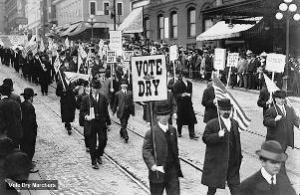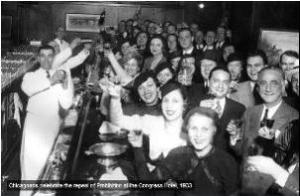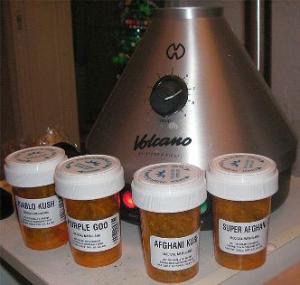In a landmark decision, the Canadian Supreme Court has blocked the Canadian government from shutting down the country's only safe injection site.
The new documentary "Prohibition," by Ken Burns and Lynn Novick, aired this week on PBS. We thinks it's well worth watching, especially for drug reformers.
Please take action by phone and online to pass the National Criminal Justice Commission Act, important bipartisan legislation calling for a thorough review of the criminal justice system and reform recommendations.
Do you read Drug War Chronicle? If so, we need your feedback to evaluate our work and make the case for Drug War Chronicle to funders. We need donations too.
Texas Gov. Rick Perry's suggestion that the US could deploy troops to Mexico to help fight the cartels was not well received by the Mexican government.
In a blow that could cripple the medical marijuana dispensary business, the IRS has ruled that Harborside Health in Oakland cannot deduct standard business expenses because it involved in "drug trafficking."
A study of medical marijuana in Los Angeles found that when dispensaries were shut down, crime went up. The results are preliminary, but suggest law enforcement has constructed a bogeyman argument about crime and dispensaries.
Bowing before federal threats, Rhode Island Gov. Lincoln Chafee has put plans to open three state-registered and -regulated medical marijuana dispensaries in the deep freeze. Next step for advocates -- the courts.
Montana's entire congressional delegation and its attorney general have stepped to oppose the ATF's contention that medical marijuana patients cannot possess firearms or ammunition.
Montana voters will get a chance to weigh in at the polls on the legislature's trashing of their medical marijuana program.
Mexican authorities capture more high-ranking cartel figures, but that doesn't seem to change anything. The killing continues unabated.
The allure of prohibition's filthy lucre snags four more officers.
Events and quotes of note from this week's drug policy events of years past.
Rebuffing the Conservative government of Prime Minister, the Canadian Supreme Court Friday ruled unanimously that Vancouver's safe injection site for heroin addicts can stay open. Known as Insite, the Downtown Eastside facility is the only safe injection site in North America.

Vancouver's safe injection site wins a reprieve. (Image: Vancouver Coastal Health)
The Downtown Eastside, centered on the intersection of Main and
Hasting, streets, has one of the highest concentrations of injection drug users in the world. An overgrown Skid Row flush with prostitution and destitution, most of its residents live in decaying SRO hotels lining Main Street. Out of 12,000 residents in the area, some 5,000 are estimated to be drug addicts.
At
Insite, drug users are provided clean needles and sterilized water with which to mix their drug.
Insite does not provide the drugs; users must bring their own. The users inject under medical supervision at one of 12 injecting alcoves.
Insite operates under the auspices of the British Columbia Ministry of Health and the local public health authority, Vancouver Coastal Health. Numerous
research reports on
Insite have found that it has reduced fatal drug overdoses, reduced HIV and Hepatitis C transmission rates, reduced crime rates in the neighborhood, and increased the number of drug users entering treatment.
It has operated since 2003 under an exemption to Canada's drug laws, but since coming to power, the Harper government has attempted to shut it down, claiming it "enables" drug users. Friday's decision by the Canadian Supreme Court is the final chapter in that effort.
The Harper government argued that the federal drug law took precedence over British Columbia's public health policies. British Columbia and other
Insite supporters argued that because
Insite is providing a form of health care, its operation is a provincial matter. The federal government's concerns did not outweigh the benefits of
Insite, the court said.
"The grave consequences that might result from a lapse in the current constitutional exemption for
Insite cannot be ignored," the court said. "
Insite has been proven to save lives with no discernible negative impact on the public safety and health objectives of Canada."
Hundreds of
Insite supporters gathered at the facility at dawn and broke out in cheers after the decision was announced. As the news spread, harm reduction, public health, and drug reform groups in Canada and around the world lined up to applaud it.
"We are absolutely delighted that we finally have a clear decision on the legal framework for
Insite," said Dr. Patricia Daly,
Vancouver Coastal Health Chief Medical Health Officer. "Since 2003,
Insite has made a positive impact on thousands of clients, saved lives by preventing overdoses, and provided vital health services to a vulnerable population. Today's ruling allows us to continue the outstanding work
Insite, its doctors, nurses, staff and partners provide."
"This represents a victory for science," said Dr. Julio
Montaner, Director of the
BC Center for Excellence for HIV/AIDS. "Prior attempts from the federal government to stop the activities of
Insite have been ruled unconstitutional. We are thankful for the continued and unwavering support from the provincial government that has allowed us to set an example in Canada and the world for how to deal with addiction which is, indeed, a medical condition."
"We applaud today's landmark decision by the Canadian Supreme Court to uphold the human rights of all Canadians by allowing
Insite to remain open," said the
Canadian HIV/AIDS Legal Network,
CACTUS Montreal, and
Harm Reduction International in a joint statement. "We are heartened the Supreme Court of Canada has recognized that criminal laws on drugs must give way to good public health practices and harm reduction."
"This is a victory for science, compassion and public health -- and, given the fiscal benefits of such programs, the Canadian taxpayer. The Supreme Court of Canada recognized that
Insite saves lives, and that that should be a guiding principle in deciding drug policy," said Laura Thomas, California deputy director for the
Drug Policy Alliance. "Congratulations to the advocates, drug users, researchers, nurses, and elected officials who have campaigned for Vancouver's supervised injection facility for so long. This is a complete validation of their work."
The Supreme Court of Canada's
Insite ruling applies only to
Insite. Other Canadian localities seeking to establish safe injection sites must win permission from the federal government. Canadian activists urged them to do so.
"In light of today's Supreme Court decision, jurisdictions Canada-wide should act fearlessly on evidence and make harm reduction services modeled on
Insite available to those in need in their locales," said the Canadian groups. "The Minister of Health must respect the court's decision and grant similar exemptions to other sites so that people across Canada will be able to access the public health services they desperately need."
There are 67 safe injection sites operating today, with one in Australia,
Insite in Vancouver, and the rest in Europe. There are no safe injection sites operating in the United States, although a move is afoot in San Francisco to get one underway there. The Drug Policy Alliance's Thomas said it is time to start pushing harder.
"For communities in the US which have been hard hit by drug use, it is time to look at the evidence from Canada and start opening supervised injection facilities here," she said. "We look forward to implementing the same desire to save lives in the US."
back to top
Prohibition: A Film by Ken Burns and Lynn Novick (2011, Florentine Films/WETA, 3 discs, 5 ½ hrs., $41.99)
One of America's leading documentarians has done it again. Ken Burns, producer of the widely watched and hailed documentaries, Baseball and The Civil War, has now teamed up with Lynn Novick to examine the rise, fall, and repeal of the 18th Amendment banning alcohol sales and production. It is a worthy effort, and well-executed.

Prohibition "postcards" online at pbs.org/kenburns/prohibition/send-postcards/
The multi-hour must-see premiered over three nights this week on PBS,
pulling in nearly four million viewers on its opening night -- very big numbers for public TV. It's also available online at the
PBS Ken Burns Prohibition web site.
For most us of Prohibition is ancient history, skimmed over bloodlessly in dusty tomes in high school and undergraduate history courses. My 83-year-old mother, for instance, was still a toddler when revelers across the land tippled with delirious joy to mark repeal. For anyone younger than her -- and that's most of us -- Prohibition is no more than a school lesson, not a thing of living memory, except, perhaps, for an old story or two told by grandpa or grandma.
One of the successes of
Prohibition is the way it brings that dry history to life. Through the skillful use of contemporary film, photographic stills, oral history, written remembrances narrated by actors, and a lively narration by Peter Coyote, Burns and
Novick are able to recreate the living, breathing reality of second half 19
th and early 20
th Century America. Staring face to face at the glowering glare of a doughty
battle-axe like Carrie Nation or the lizard-lidded, full-lipped gaze of Chicago gangster Al Capone, listening to Al Smith rail against the dries or Mabel
Willibrand rally preachers against repeal, helps us put a human face on the passions and frailties behind the march of the social revolution that was Prohibition and the mass rejection of it that was repeal.
Similarly, vivid scenes of saloon debauchery, with passed out drunks and giddy tipplers, of speakeasies filled with good-time guys and giddy flappers, of mass marches for and against, of political conventions and campaigns in which Prohibition was a burning issue of the day, help put living flesh on the dry bones of history.
The early 20
th Century experiment in social control and legislating morality contains many lessons for contemporary activists seeking to undo the damage done by drug prohibition. Burns and
Novick deserve our thanks for teasing out the varied strands that turned the 19
th Century's temperance movement among mostly rural, Protestant, church-going women into a political powerhouse capable of blunting the power of big booze, shuttering the breweries and distilleries, and eliminating the saloons men saw as their last refuge from the demands of wife and children.
For me, the most important achievement of
Prohibition is the way in situates the temperance movement within the broader social and political context of a tension-filled, rapidly evolving America. As Burns and
Novick make abundantly clear, Prohibition did not happen in a vacuum. Among the forces propelling it were many of the same forces active today propelling reactionary social movements: racism (directed against newly arrived Irish, German, and Jewish immigrants), nativism (ditto), religious bigotry (aimed at those Catholic immigrants), nationalism (against mainly German-American beer brewers, especially during World War I), and rural vs. urban tensions.
But while it may be easy to ridicule the reactionaries of the last century, the roots of Prohibition also come uncomfortably close for present-day progressives. The temperance movement -- in all its intemperance -- was closely tied to "what about the children!" sentiment and women's suffrage, a cry for healthy living, as well as the sort of "
do-gooderism" conducted by "busybodies" that still informs much of the discourse when it comes to drug policy reform today.
As
Prohibition shows most excellently, the politics of morality and social control are deep and twisted, and unraveling them reveals some unflattering facets of progressivism, as well as the more easily derided absolutists of what could fairly be called the Christian Right.
Where
Prohibition is perhaps most useful to modern day drug reformers is in its depiction of the social ills it generated. Much as the Drug Policy Alliance likes to say "drug abuse is bad, drug prohibition is worse," viewers of Prohibition could fairly draw the conclusion that "mass drunkenness is bad, mass drunkenness under Prohibition is worse." Burns and
Novick sketch the rapid expansion of organized crime under Prohibition, the gang wars of Chicago and New York, the corruption of cops and public officials -- all the side-effects of prohibition so familiar to present day reformers.

Prohibition "postcards" online at pbs.org/kenburns/prohibition/send-postcards/
But they also look at its public health consequences, which -- like current drug prohibition -- were also in many ways disastrous. There were mass deaths from bad bathtub gin, deaths from drinking wood alcohol, outbreaks of "Jake Leg," a neurological disorder caused by contaminated whiskey that crippled hundreds, if not thousands, and while alcohol consumption initially declined, that decline was soon reversed, and with even more unhealthy drinking patterns.
In the end, Prohibition died of neglect, ridicule, and changing social attitudes, forged at least in part by the experience of Prohibition itself. And at the end, it revealed itself to be hollow, crumpling with amazing rapidity after the Great Depression hit and the big city, immigrant-friendly Democrats under FDR took power. Before the end of FDR's first year in office, Prohibition was history.
There are many lessons and parallels for contemporary drug reformers in
Prohibition, but they are not exact and may not apply across the board. Alcohol prohibition lasted barely a decade, but drug prohibition is now in its second century. Why one was a flash in the pan and the other remains a painful, enduring legacy are questions that need to be answered if we are ever to leave drug prohibition in the dustbin of history along with Prohibition.
Prohibition can help us start to ask the questions that will give us the right answers.
Disappointingly, Ken Burns doesn't appear interested in pursuing the parallels, nor even the dissimilarities, between Prohibition then and prohibition now. He does not reference the prohibition of other drugs in
Prohibition (although heroin and cocaine were already criminalized federally and marijuana was being banned in a number of states), nor, as he has
made clear in interviews, does he see a useful comparison between the two.
But that disagreement or lack of boldness notwithstanding, Prohibition is still a great viewing experience that brings alive a critical episode in US social and political history, an episode who reverberations still linger and whose contours are still echoed in drug prohibition. This is
your history, America -- watch, enjoy, learn, and ponder.
back to top
Today is the National Call-In Day to pass a very important bill, Sen. Jim Webb's National Criminal Justice Commission Act. Read more about the
NCJCA here.
Last year the Act passed the House of Representatives with strong bipartisan support, but despite having similar support in the Senate did not make the calendar.
Please call the US Senate leadership today (or on the first possible business day when you see this) and ask them to prioritize and pass the National Criminal Justice Commission Act, S. 306:- US Senate Majority Leader Harry Reid (D-NV), 202-224-3542
- US Senate Minority Leader Mitch McConnell (R-KY), 202-224-3135
When you are done, please use our web site to email your own US Representative and your two US Senators in support of the National Criminal Justice Commission Act. You can also use our web site to look up who your members of Congress are and their phone numbers. Please forward this email to spread the word too.
Following are some taking points to assist you with your call:
- I am calling to ask the senator to support immediate Senate passage of S. 306, the National Criminal Justice Commission Act.
- The proposed commission would review the criminal justice system, identify programs and policies that promote public safety, and urge but not mandate reform of policies and practices that aren't working.
- One policy that needs review is mandatory minimum sentencing. Thousands of offenders receive lengthy mandatory terms. These sentences have filled prisons across the country well beyond capacity.
- The current incarceration rate comes at a high cost to taxpayers, families and communities.
- Passage of S. 306 will lead to a more effective and just system. Please pass the bill.
Thank you for supporting this important effort -- send us an email to let us know you took action and how it went!
back to top
Dear reformer:
Thank you for helping StoptheDrugWar.org publish 700 issues of Drug War Chronicle!
If you value the service that Drug War Chronicle and StoptheDrugWar.org provide, I hope you'll consider supporting us in one or both of two ways:
- We are in between newsletter grants, and that makes our need for individual donations more important right now -- Drug War Chronicle is free to read but not to produce! Click here to make a donation by credit card or PayPal, or to print out a form to send in by mail.
- Please send quotes and reports on how you put our flow of information to work, for use in upcoming grant proposals and letters to funders or potential funders. Do you use StoptheDrugWar.org as a source for public speaking? For letters to the editor? Helping you talk to friends or associates about the issue? Research? Personal edification? Have you changed your mind about any aspects of drug policy since subscribing, or inspired you to get involved in the cause? Do you reprint or repost portions of our bulletins on other lists or in other newsletters? Do you have any criticisms or complaints, or suggestions? We want to hear those too. Please send your responses -- one or two sentences would be fine; more is great, too -- by email [email protected] or reply to a Chronicle email or use our online comment form. Please let us know if we may reprint your comments, and if so, if we may include your name or if you wish to remain anonymous. IMPORTANT: Even if you have given us this kind of feedback before, we could use your updated feedback now too -- we need to hear from you!
If you prefer to donate by mail, you can send your check or money order to: DRCNet, P.O. Box 18402, Washington, DC 20036. Make your check payable to DRCNet Foundation to make a tax-deductible donation for Drug War Chronicle -- remember if you select one of our member premium gifts that will reduce the portion of your donation that is tax-deductible -- or make a non-deductible donation for our lobbying work -- online or check payable to Drug Reform Coordination Network, same address. We can also accept contributions of stock -- email [email protected] for the necessary info.
Again, thank you for helping us reach this milestone, and for joining us today to celebrate it -- a brighter future lies ahead, with your help.
Sincerely,

David Borden, Executive Director
StoptheDrugWar.org
Washington, DC
http://stopthedrugwar.org
back to top
Mexico's ambassador to the US reiterated Monday that deploying US troops to Mexico to help fight violent drug trafficking organizations is not an option. Ambassador Arturo Sarukhan was responding to remarks made by GOP presidential contender Texas Gov. Rick Perry.

US-Mexico border (wikimedia.org)
On Saturday, Perry raised eyebrows by suggesting on the campaign trail that Mexico's problems with the so-called cartels might require US military assistance. His comments came in response to a question while campaigning in New Hampshire.
"It may require our military in Mexico working in concert with them to kill these drug cartels and to keep them off of our border and to destroy their networks,"
Perry said.
That idea wouldn't fly,
Sarukhan said in remarks to reporters Monday. "The issue of participation, or the presence of, US troops on Mexican soil is not on the table." Having US troops on Mexican soil "is not a element of strategy that is being foreseen, not a part of the tremendously innovative ways in which Mexico and the United States have been using to fight transnational organized crime." No US troops has been Mexico's policy "for a very long time," he added.
Mexico has been sensitive about the issue of US troops since 1848, when the US seized half of Mexico's national territory in the Mexican-American War. That historic trauma has led Mexico to make non-interventionism a pillar of its foreign policy.
The US and Mexico do cooperate in the struggle to suppress the drug trade, mostly through information exchanges, but also via the $1.4 billion Plan
Merida aid package. But neither Mexican troops nor American aid dollars have been able to suppress the outbreak of bloody prohibition-related violence plaguing Mexico since President Felipe Calderon deployed the military against the cartels in late 2006.
(This article was published by StoptheDrugWar.org's lobbying arm, the Drug Reform Coordination Network, which also shares the cost of maintaining this web site. DRCNet Foundation takes no positions on candidates for public office, in compliance with section 501(c)(3) of the Internal Revenue Code, and does not pay for reporting that could be interpreted or misinterpreted as doing so.)back to top
In a decision that advocates warn could cripple the industry, the Internal Revenue Service (IRS) has ruled that Oakland's Harborside Health Center cannot deduct standard business expenses on its taxes and sent the dispensary a whopping $2.5 million tax bill.
Most businesses are able to deduct standard business expenses, such as rent and payroll, from their federal tax bill, but
Harborside chief financial officer Luigi
Zamarra told the
Bay Citizen the IRS had determined the dispensary cannot deduct standard business expenses because it is involved in "the trafficking of controlled substances."
Harborside is the largest medical marijuana dispensary in the country, with more than 83,000 members, and pulled in $22 million in sales last year. It has already paid the IRS $500,000 in taxes for 2007 and 2008, the years for which the agency now claims it owes the additional $2.5 million.
Although the IRS is happy to take
Harborside's money, the federal government considers marijuana nothing more than a Schedule I controlled substance. The IRS attack on
Harborside is part of an Obama administration assault on medical marijuana distribution using the regulatory apparatus of a number of federal agencies, ranging from the Treasury to the DEA.
Harborside said it would appeal the ruling and warned that if it stood, the entire medical marijuana dispensary industry could be endangered.
"We can't live with the conclusions that the IRS has come to and neither can the industry,"
Zamarra said. "If the IRS ultimately prevails, we would close our doors and go away because the business model wouldn't work,” he said.
Ironically, on the same day it announced the adverse IRS ruling,
Harborside also announced it had paid the last installment of its $1,081,450 tax bill to the city of Oakland, which collects a 5% tax on dispensaries.
back to top
Opponents of medical marijuana dispensaries have long argued that they are magnets for criminality, but a study released last week by the RAND Corporation does not support that contention. The RAND study found that crime rates rose in surrounding neighborhoods when dispensaries were shut down when compared to areas where dispensaries were allowed to stay open.

Neighborhoods are safer where dispensaries are open, a RAND study finds. (image via wikimedia.org)
The study examined neighborhoods in Los Angeles for 10 days before and 10 days after more than 70% of the 638 dispensaries in the city were shut down on June 7, 2010. Researchers found that incidents such as break-ins rose in neighborhoods where dispensaries were shut down.
In the immediate blocks surrounding closed dispensaries, crime increased 60% more than in the blocks surrounding dispensaries that were allowed to stay open. Those effects in the immediate vicinity were not apparent across a wider area.
"If medical marijuana dispensaries are causing crime, then there should be a drop in crime when they close," said
Mireille Jacobson, the study's lead author and a senior economist at RAND. "Individual dispensaries may attract crime or create a neighborhood nuisance, but we found no evidence that medical marijuana dispensaries in general cause crime to rise."
The expansion of medical marijuana dispensaries in states such as California and Colorado have given rise to oft-voiced concerns by law enforcement and some neighborhood activists that the outlets are a public nuisance that create crime, but such concerns have not previously been subject to rigorous evaluation. The RAND study is the first systematic analysis of the link between medical marijuana dispensaries and crime.
Researchers suggested that the crime increase near closed dispensaries could be caused by factors such as the loss of foot traffic, the loss of on-site security provided by dispensaries, an increase in outdoor drug activity, or changes in police practices, such as fewer nearby patrols.
RAND said that because of the limited data and the short period of time in its study, the study's results should be viewed as preliminary, but that they could inform policy makers' decision-making process.
UCLA researcher Bridget
Freisthler, who is studying crime around dispensaries in Sacramento,
criticized the RAND study as "deeply flawed" for precisely the reasons RAND noted above. Still,
Freisthler's own research results so far tend to dove-tail with the RAND findings. Last year, she examined 31 Sacramento dispensaries and found that those with security cameras, guards, and signs announcing that buyers needed cards had lower crime rates in the immediate vicinity than those that didn't.
But it is too simple even from her own research to just say "pot clubs don't cause crime," she said. "I suspect what's going on, although we don't know for sure, is that those areas that already had a strong illegal drug market aren't really seeing a lot of dispensaries because access to marijuana is already easy," she told UCLA's news department. "The dispensaries are finding a market among people who aren't willing to buy on the street. Whether people in charge of the drug markets in dispensary-free areas are actively trying to keep the dispensaries out, I don't know."
The Los Angeles County Sheriff's Department was also critical of the RAND findings, citing a small number of high-profile crimes committed against dispensaries. In one incident last year, a dispensary employee was shot to death on the job, and in another, two days later, a dispensary employee was shot to death.
"We question the findings," sheriff's department spokesman Steven
Whitmore told
NBC Los Angeles. "We don't think they're accurate. We want to know where exactly they're talking about and how they're coming to these conclusions because we’ve had some very dangerous crimes that have happened at these dispensaries."
But he didn't cite any hard data. And the only hard data so far suggests that, law enforcement claims notwithstanding, there is little support for the notion that dispensaries are crime magnets.
back to top
Bowing to pressure from Washington, Rhode Island Gov. Lincoln Chafee (I) announced last Thursday that he will not allow the state to move forward with a plan to open three long-delayed medical marijuana dispensaries. That leaves thousands of Rhode Island patients to their own devices when it comes to procuring their medicine.

Lincoln
"After much internal and external discussion and research, I have decided that the State of Rhode Island cannot proceed with the licensing and regulation of medical marijuana compassion centers under current law,''
Chafee said in a
statement.
The announcement came two days after the
Rhode Island Patient Advocacy Coalition announced its plans to sue the governor and force him to lift his hold on the compassion centers.
Rhode Island became a medical marijuana state in 2006, when the legislature overrode a gubernatorial veto to pass the Edward O. Hawkins and Thomas C. Slater Medical Marijuana Act. But that law did not allow for dispensaries, and in 2009, the legislature passed a law authorizing the cultivation and distribution of medical marijuana through three state-registered and -regulated dispensaries.
Despite growing pressure from patients and doctors, movement toward actually implementing the dispensary system was achingly slow. After two years of reviews and public hearings, the state announced in March that it had selected three dispensaries to serve Rhode Island's nearly 4,000 registered patients. But the next month, US Attorney Peter
Neronha sent
Chafee a letter warning that people involved in large-scale drug production operations could face civil and criminal prosecution, prompting
Chafee to block the issuing of licenses pending clarification from
Neronha and the US Department of Justice.
Now,
Chafee has decided that the federal threats are valid.
"Unfortunately, Rhode Island's compassion center law is illegal under paramount federal law," he said in the statement. "And, while the United States Attorney in each district is given some discretion in the local enforcement of federal laws, I have received communications from both the United States Department of Justice and from the United States Attorney for the District of Rhode Island that large scale commercial operations such as Rhode Island's compassion centers will be potential targets of 'vigorous' criminal and civil enforcement efforts by the federal government. I cannot implement a state marijuana cultivation and distribution system which is illegal under federal law and which will become a target of federal law enforcement efforts. Federal injunctions, seizures, forfeitures, arrests and prosecutions will only hurt the patients and caregivers that our law was designed to protect."
Chafee added that he remains "committed to improving the existing medical marijuana cultivation and distribution system in Rhode Island" and that he hoped the legislature would address flaws in the system in the upcoming session. "I pledge to work with advocates, patients and members of the General Assembly towards that end."
No state or national groups had officially reacted to
Chafee's move by the time this story went to press, but in an email announcing the bad news, the
Marijuana Policy Project urged supporters to tell
Chafee to "reverse course" and let the program go ahead. Federal threats hadn't stopped other states, the group noted.
"It's been over two years since the General Assembly passed legislation creating compassion centers in Rhode Island,"
MPP wrote. "In that time, Maine, Vermont, Delaware, Arizona, and New Jersey have all enacted laws allowing for regulated dispensing of medical marijuana. All of these states, with the exception of Arizona, are moving forward with giving patients the humane option of safe access, despite the fact that the laws irk officials in DC."
back to top
Montana's attorney general has become the latest high-ranking political figure in Big Sky Country to blast the Obama administration and its Department of Justice over a September 21 memo from the Bureau of Alcohol, Tobacco & Firearms (ATF) instructing federal licensed firearms dealers that medical marijuana patients are "addicts" or "Illegal drug users" who cannot be sold firearms or ammunition. [Editor's Note: See our September 28 feature article on the issue here.] Attorney General Steve Bullock (D) now joins the entire state congressional delegation in blasting the administration's position.

MMJ leaf and stethoscope KY ODCP.jpg
Montana, which legalized medical marijuana through a popular vote in 2004, has more than 24,000 registered medical marijuana patients. It also has more than 200,000 hunters and issued more than 580,000 hunting licenses last year.
In a
letter sent Monday to US Attorney General Eric Holder, Bullock strongly objected to the ATF's "unilateral" approach to the issue and said he was willing to explore "reasonable solutions" to the problems created by the AFT letter. The goal would be to find an approach that works for the 16 states and the District of Columbia that have legalized medical marijuana, he said.
"This would be much better than the type of unilateral proclamation represented by the ATF letter, which was issued without any advance notice or discussion with the elected officials who represent more than one-fourth of this nation's population and one-third of its states," Bullock wrote. "In the meantime, I respectfully request that the Department of Justice not pursue any criminal prosecutions against law-abiding citizens in Montana who exercise their constitutional rights to possess guns and enjoy hunting, or the licensees who are implicitly threatened by ATF's letter."
The ATF memo warns dealers they cannot sell guns or ammo to medical marijuana users "even if the person uses it in full compliance with state law that authorizes its use for medical purposes," Bullock complained. "The letter even takes it a step further by emphasizing that ATF is placing the responsibility on licensees to determine if there is reasonable cause to believe that the purchaser did not accurately fill out the ATF forms," he said.
While recognizing the supremacy clause in the US Constitution, Bullock added that the AFT memo raised constitutional issues around the right to bear arms, equal protection, and due process. "In our federal system of dual sovereignty, I respectfully suggest that the federal government should act in a careful manner when its laws and policies involve conflicts with those of the state," he said.
Bullock is just the latest high-ranking Montana elected official to come out swinging against the ATF memo. Last week,
Sens. Max
Baucus (D) and Jon Tester (D) joined US Rep. Denny
Rehberg (R) in criticizing the federal move.
In a
letter last Wednesday to Holder and memo author Arthur Herbert, ATF assistant director for enforcement, Tester urged them to "immediately reconsider this misguided effort."
"These regulatory changes infringe upon the privacy and Second Amendment rights of
Montanans while placing an unreasonable burden upon the small-business owners who sell firearms and ammunition," Tester said. "It is unacceptable that law-abiding citizens would be stripped of their Second Amendment rights simply because they hold a state-issued card authorizing the possession and use of marijuana for medicinal purposes.
Tester's colleague Max
Baucus also chimed in. "Our Second Amendment rights are a part of who we are as
Montanans, and I’ve always fought hard to protect our right to bear arms,"
Baucus said. "I’m concerned to hear ATF may be impeding the rights of law-abiding folks. Individual gun rights must be protected and I’ll never stop fighting to make sure they stay intact."
A spokesman for Rep.
Rehberg told the
Billings Gazette that he, too, opposed the policy. "Between the ATF clamping down on gun rights and two new anti-gun Supreme Court justices,
Montanans’ Second Amendment rights are once again under fire from Washington," spokesman Jed Link said Thursday. "Denny’s going to keep fighting to protect this critical right from Washington overreach, whether it is legislative, executive or judicial."
The criticisms from high-ranking elected officials come on the heels of angry reactions last week from medical marijuana advocates and gun rights advocates in Montana. In a fiercely divided state, the ATF memo has managed to unite Republicans and Democrats, at least on one issue.
back to top
An initiative that would let Montana voters undo legislative changes that gutted the state's medical marijuana law will be on the ballot in November 2012. According to the Montana Secretary of State, organizers for I-124 have collected enough signatures to make the ballot.

medical cannabis with vaporizer (wikimedia.org)
The initiative needed 24,337 valid voter signatures to make the ballot; it handed in 26,778 valid signatures. It needed to obtain the signatures of at least 5% of registered voters in at least 34 of the state's 100 legislative districts; it qualified in 49.
The initiative campaign is in response to the Republican-controlled state legislature, which first passed a bill to completely repeal the state's voter-approved medical marijuana law, and then, after it was vetoed by
Gov. Brian Schweitzer (D), passed another bill, Senate Bill 423, essentially killing the state's medical marijuana distribution system. That bill was challenged in court, and parts of it were enjoined, but other onerous portions of it remain in effect.
That will be the case until and unless
Montanans vote for the initiative next November. Organizers could have attempted to repeal the law outright through the initiative process, but that would have required three times the number of signatures needed to get this measure on the ballot, and that was beyond the reach of the ill-funded, nearly all-volunteer effort.
See our
feature story last week for more on the Montana campaign to repeal SB 423.
back to top
by Bernd Debusmann Jr.
Mexican drug trafficking organizations make billions each year smuggling drugs into the United States, profiting enormously from the prohibitionist drug policies of the US government. Since Mexican president Felipe Calderon took office in December 2006 and called the armed forces into the fight against the so-called cartels, prohibition-related violence has killed around 40,000 people, including more than 15,000 last year. The increasing militarization of the drug war and the arrest or killing of dozens of high-profile drug traffickers have failed to stem the flow of drugs -- or the violence -- whatsoever. The Merida initiative, which provides $1.4 billion over three years for the US to assist the Mexican government with training, equipment and intelligence, has so far failed to make a difference. Here are a few of the latest developments in Mexico's drug war:
Wednesday, September 28
In
Ciudad Juarez
, at least four people were murdered. In the
Granjas de
Chapultepec neighborhood, a family of three was executed in their home after it was attacked by a group of at least eight hooded gunmen.
Thursday, September 29
In Monterrey
, three men were shot dead by heavily armed gunmen. Reports indicate that the victims were driven to the scene of the crime by men traveling in SUVs, who lined them up against a wall and executed them.
Friday, September 30
In Veracruz,
Mexican marines captured a wanted Zeta hit man. Angel Mora, also known as "
Comandante Diablo," was captured alongside one other man. Mora is thought to operate in Veracruz and Boca Del Rio and is suspected of being involved in the killing of three marines in Late July.
In
Ciudad Juarez,
September ended with 146 murders. This is an increase from the 122 killed in August, but fewer than the 218 killed in July. February was the bloodiest month in the city this year, with at least 231 murders haven taken place.
According to statistics kept by researcher Molly Molloy, the death toll this year in Juarez is approximately 1,600, or about 5.8 a day. The death toll since January 2008 is over 9,000. October 2010 was the city's most violent month, with 350 murders.
Saturday, October 1
In New Hampshire, Republican presidential candidate Rick Perry
said that he is open to sending American troops to Mexico to help the Mexican government combat drug cartels. Perry compared the situation in Mexico today to that of Colombia in the late
1980s and early
1990s.
"I think we have to use every aspect of law enforcement that we have including the military. I think we have the same situation as we had in Colombia. Obviously, Mexico has to approve any type of assistance that we can give them," he said.
Sunday, October 2
In
Zihuatenejo, Guerrero
, seven bullet-riddled bodies were discovered near a downtown bus station. A note left with the bodies claimed to be from the Knights Templar organization, an off-shoot of La
Familia Michoacana.
In
Mazatlan,
three men and two women were gunned down outside a liquor store. Mazatlan is a well-visited tourist resort in the state of
Sinaloa, which is widely considered the historical birthplace of drug trafficking in Mexico.
Monday, October 3
In Mexico City,
police discovered two severed heads near to the city’s most important military facility. It is the first multiple decapitation reported in Mexico City since January 2008. A note left near the heads mentioned the "Hand with Eyes" organization. Mexico City has been largely spared from drug-related violence.
In Nuevo Leon,
175 local police officers were arrested during a three-day sweep of
Apodaca,
Pesqueria, Mina, and Santa Catalina. At least 7 of the 82 officers detained in
Apodaca are thought to have been involved in the August murder of a man who was detained after being caught spying on the officers.
In Nicaragua,
police arrested three men thought to have been recruiting men to go to Mexico and fight for the
Zetas. The three men had apparently been tasked with identifying men with military experience and offering them $2,000 a month to go to Mexico. A fourth suspect has been identified, and is alleged to have been paid $4,000 per recruit.
Tuesday, October 4
Near Veracruz,
nine previously escaped inmates were recaptured during a marine raid on a suspected Zeta camp in a rural area outside the city. Five other suspects were taken into custody during the operation.
In Tijuana, 358 kilograms of cocaine were seized near the border with the US. It is unclear to whom the shipment belongs, but a similar operation carried out a week ago netted 232 kilograms which are thought to belong to El
Chapo Guzman's
Sinaloa Cartel.
In Acapulco
, two men were shot dead inside a shop. At least two vehicles, including a Hummer, were set on fire by the gunmen as they made their escape.
In
Michoacan,
a federal anti-narcotics unit captured one of the last remaining members of La
Familia Michoacana, Martin Rosales
Magana. Three other men were taken into custody during the operation. Federal authorities say that Rosales was planning a mass attack on the rival Knights Templar Organization with some 200 gunmen.
[Editor's Note: We can no longer tally this year's drug war deaths in Mexico with any degree of accuracy. The figure for this year's deaths is an estimate, no more, until there is some official toll.]
Total Body Count for 2007 (
approx.): 4,300
Total Body Count for 2008 (
approx.): 5,400
Total Body Count for 2009 (
approx.): 9,600
Total Body Count for 2010 (official): 15,273
Total Body Count for 2011: (
approx.): 7,500
back to top
The allure of prohibition's filthy lucre snags four more officers. Let's get to it:
In Houston,
a Houston Baptist University police officer was arrested September 29 after he got caught in a sting trying to rob a supposed drug courier. Officer Jesse Perry, 30 is facing charges of possession with the intent to deliver a kilogram of cocaine. Perry allegedly took the cocaine from two undercover officers after pulling them over 30 minutes northeast of campus. He was in uniform and used his pet dog to sniff the kilo of cocaine before confiscating and driving to a nearby parking lot, where he was then arrested. At last report, Perry was in the Harris County Jail on a $52,000 bail bond. He's looking at up to life in prison.
In Bronson, Florida,
a Levy County Sheriff's Office jail guard was arrested September 29 on charges he was using and peddling
oxycodone. Richard Harris, 26, is charged with one count of sale of a controlled substance and possession with the intent to distribute. Harris went down after the sheriff's office asked the Florida Department of Law Enforcement to look into allegations he was part of the prescription drug trade in the community and investigators set him up in a controlled buy.
In Braddock, Pennsylvania,
a Braddock police officer was arrested Tuesday on a variety of drug and other charges. He is accused of several thefts and burglaries, then stealing crack cocaine from the police department to pay a potential witness so she wouldn't cooperate with state investigators. He is charged with manufacturing, delivering or possessing a controlled substance; burglary; theft from a motor vehicle; conspiracy to commit theft; criminal mischief; criminal trespass; false insurance claim; false reports; obstructing the law; two counts of theft; two counts of receiving stolen property; and two counts of conspiracy to commit burglary. At last report, he was being held at the Westmoreland County Prison on a $10,000 bail bond.
In Sacramento,
a former Concord police officer was sentenced last Friday to 18 months in federal prison for his role in a
Chico marijuana cultivation operation. Damon
Rydell, 36, had been part of an indoor grow-up busted with more than 200 plants and had claimed he thought the state's medical marijuana law allowed him to grow that many plants. He must also do three years probation and pay a $7,500 fine.
back to top
October 8, 1932: The Uniform State Narcotics Act is passed, endorsed by the federal Bureau of Narcotics as an alternative to federal laws. By 1937 every state prohibits marijuana use.
October 12, 1984: The Comprehensive Crime Control Act becomes law, establishing federal "mandatory minimum" sentencing guidelines eliminating judges' discretion when handing down prison terms. Over the next two years drug sentences increase by 71% nationwide.
October 7, 1989: Former US Secretary of State George P.
Shultz tells an alumni gathering at Stanford Business School, "It seems to me we're not really going to get anywhere until we can take the criminality out of the drug business and the incentives for criminality out of it. Frankly, the only way I can think of to accomplish this is to make it possible for addicts to buy drugs at some regulated place at a price that approximates their cost... We need at least to consider and examine forms of controlled legalization of drugs... No politician wants to say what I have just said, not for a minute."
October 6, 2000: Former US President Bill Clinton is quoted in Rolling Stone: "I think that most small amounts of marijuana have been decriminalized in some places, and should be."
October 9, 2000: PBS begins a special two-day program entitled "Drug Wars." The series examines America's ceaseless efforts over the past three decades to stop the flow of illegal drugs into the country, and shows how the drug war wastes hundreds of billions of dollars, alters the criminal justice system, puts millions of people in jail, and allows organized crime to thrive.
October 10, 2002: Drug Czar John Walters travels to Las Vegas, Nevada and begins two days of making appearances around the state illegally lobbying against Question 9, a proposal to amend the state constitution by making the possession of three ounces or less of marijuana legal for adults. The measure is defeated at the polls the following month.
October 7, 2003: Comedian Tommy Chong begins a nine-month federal prison sentence for operating a glass blowing shop that sold pipes to marijuana smokers.
back to top












